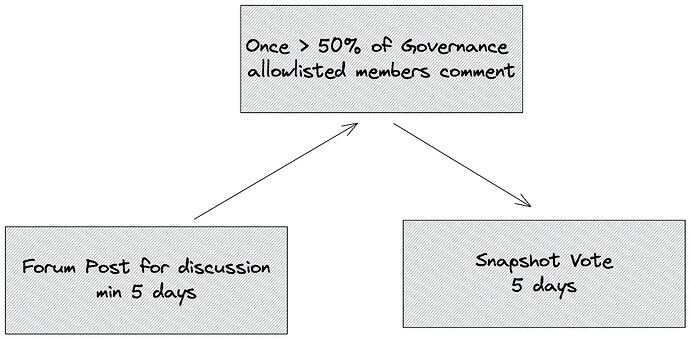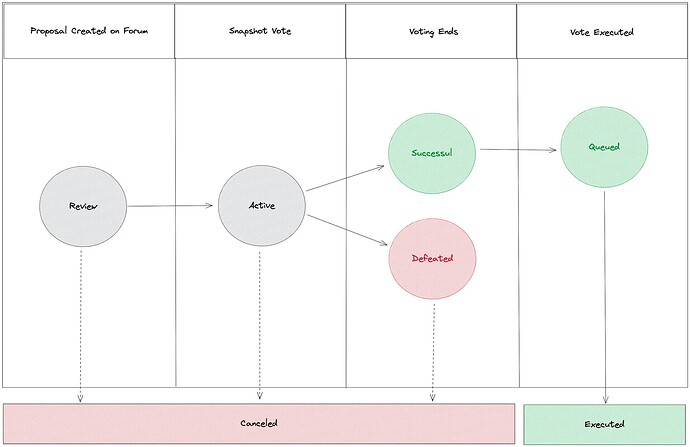Authors: @kempsterrrr , @Erik_Knobl
Previous discussion:
Summary
The proposal updates the DDIP process in the following ways:
- Removes the forum vote stage and introduces a new mechanism of qualifying how proposals can be elevated to Snapshot.
- Further simplifies for DDIP process by removing the “Conversation” stage, allowing the proposal to immediately enter the forum stage, shifting the focus of all Governance conversations more towards the forum.
- Clarifies the process for how a member joins the allowlist of members who have the ability to elevate the proposal to snapshot (and directs a new conversation to be started on re-considering how the allow list currently works).
- Lowers the threshold for a member to join the allowlist from 50,000 $CODE to 25,000 $CODE
- Introduces clarity on how we handle certain edges cases
Motivation
This proposal has the following goals:
- Speed up the DDIP process to increase Governance momentum in the DAO
- Simplify and better document the DDIP process to increase engagement and participation in Governance
- Clarifying the path through which DAO members can attain permissions to elevate proposals to Snapshot
- Lowering the threshold for members to join our Governance allowlist
Scope of Work
Below is an updated proposal for our DDIP process to achieve the stated motivations above.
You can find the original DDIP process here.
–
What is a DDIP?
A Developer DAO Improvement Proposal (DDIP) is a proposal that seeks to enact a change or changes regarding how the DAO is governed.
DDIPs should be limited to the following areas:
- Any decision that impacts the Treasury balance or allocation that is not already accounted for in a previous proposal.
- Anything that impacts the Governance of the DAO
- Anything that impacts the “The Developer DAO Foundation.”
Anything outside of this can be performed freely within pre-determined structures and mechanisms in the DAO.
Note, the Directors and the Supervisor of the Developer DAO Foundation are subject to their fiduciary duty to uphold the Articles and Bylaws of the Foundation and ensure actions remain with the law of the Cayman Islands and they reserver the right to block DDIPs that compel them to act otherwise.
As per the bylaws, the DAO retains the right to change the Articles and Bylaws of the Foundation via DDIP, so long as changes do not fall outside of the laws related to the Foundation that superseded the Bylaws. The DAO also retains the right to dissolve the Foundation as its representative entity should it so choose via DDIP.
Who can create a DDIP?
Any DAO member can submit a DDIP. Only members of our Governance allowlist can elevate forum proposals to Snapshot for a binding off-chain vote by the community. To be eligible for elevation to Snapshot, at least 50% of the existing members of this allowlist must comment on the proposal on the forum.
Once this threshold has been reached, any one of them can elevate to a vote.
A record of members with this privilege is maintained on Snapshot under “members” here.
Our Governance allow list currently consists of original core team members. Any DAO Member can apply to be added to this list if they hold over 25,000 $CODE tokens (the $CODE distributed to the original core team at Genesis).
To apply, members must submit a DDIP proposal requesting their inclusion detailing how they intend to use the privilege to support the DAO’s mission. Once over 50% of existing allowlist members have commented on their application, any allow list member can elevate their request to Snapshot for a vote locked to existing allowlist members.
Existing allow list members can rescind this privilege at any time. Any member can also submit a DDIP to remove a member of the allowlist, which must follow the process outlined above for including a member with a majority vote of existing allowlist members resulting in one’s removal.
How does the DDIP process work?
DDIPs must follow the process and format specified below to qualify for our Governance process:
Discussions
Most governance discussions before a Proposal should take place on the official Developer DAO forum. This is to ensure the community has all the information it needs to make an informed decision about proposals and to provide transparency into what was decided, what was done, and why. Certain discussions, which are often cross-stream governance discussions, would also take place in the weekly DAO Coordination call or at community-wide Town Halls.
Discussions are not required but strongly recommended, as transparent Governance is essential to a healthy DAO.
Proposal
Any member can post a DDIP to the forum for debate using this template. The proposal should be posted to the Proposals forum category with the title “DRAFT - Insert Proposal Name”.
Once the below requirements are met, any existing member of the Governance allowlist can elevate the proposal to SnapShot for a binding vote.
Quorum Requirement: A minimum of 50% of existing members of the Governance allowlist must comment on the proposal.
Time requirement: A minimum of 120 hours must pass before a proposal can be elevated from the Forum to Snapshot.
Snapshot Vote
Only DDIPs that have successfully met the requirements for the Forum discussion can be elevated to Snapshot. Snapshot votes use the same template as the Forum discussion however their title should be updated to “P:NUMBER - Proposal Name” and must include a vote of all DAO members with the following options:
- Yes
- No
- Abstain
To pass, Snapshot votes require needs a simple majority.
All successful DDIPs must be shared with the Foundation supervisor and directors on the following email address to check for legality before execution and for records to be kept at the Foundation:
Quorum requirement: A minimum of 2% total circulating $CODE will constitute a quorum.
Time requirement: A minimum of 120 hours (5 days) must pass before a voting decision can be determined.
Edge Cases
Conflicts of interest
Members are expected to abstain from votes that directly benefit themselves (i.e. voting to pass a budget request that rewards them). Such violations will render votes invalid unless corrected before the Snapshot vote ends.
Conflicting proposals
Conflicting proposals are proposals that are active at the same time and address the same issue.
In the case of a conflicting proposal, the 5-day proposal discussion period can also serve as a time for community members to provide their preferred alternative.
If a conflict still exists at the end of the discussion period, a Snapshot vote will be put forward that includes all the possible options from the conflicting proposals.
Drawbacks
- Reduces the amount of inherent Sybil resistance in DDIP by removing the forum vote stage.
- Whilst it clarifies how a member can join the Governance allowlist, this still remains a very small group of people in the DAO.
- It still does not fully clarify the Steward role in Governance
Votes
- Yes
- No
- Abstain
Next Steps
If this vote passes in the affirmative, the following actions must be taken within 120 hours (5 days).
- An updated breakdown of DDIP must be posted to the Governance forum and pinged to the top of the Proposal category.
- An updated version of the DDIP template should be posted to the forum and pinned to the top of the Proposal category under the DDIP process.
- An updated breakdown of DDIP must be posted to the home page of the DAOs wiki and included for consumption during DAO onboarding.


